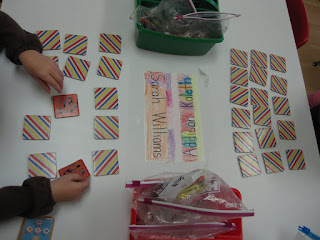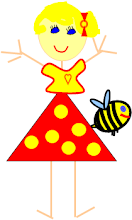There are many kinds of puzzles and games you can include in your early childhood classroom. Puzzles and games present great opportunities for growth and development.
Socially
Games provide time for children to learn to take turns, talk together, and learn to follow rules.
Emotionally
Games and puzzles provide time for children to work through their sense of fairness and allow children to feel accepted into part of a group as they participate with the others. Some games can also be played independently which allows children time to enjoy some time alone.
Cognitively
Games and puzzles present many challenges to a child's ability to concentrate and process information.
Physically
Games and puzzles increase a child's fine motor skills as they manipulate the puzzle or game pieces. Games provide large motor opportunities such as relay games, ball games, bean bag games, and even some board games encourage children to stretch and move.
Selecting Games
When selecting games for your class, be sure to look for games your children will be able to understand and play. They do not have to play the games correctly all the time. Some children will make up their own rules or activity with game pieces and this is fine too. However, teach your students how to take care of the game pieces. Teach them how to put them back in the box when they are done so they can play with them again on another day.
Introducing Games
When first introducing a new game, sit down with a group of children and play the game with them. Take time to teach the children how to play the games and be patient as they learn to process the rules of the game and the information on how to play the game. Introduce the game often and before long, they will enjoy playing the game on their own. Don't introduce too many new games all at one time. Build your game center slowly and keep adding over time so the children will be better able to play each game and enjoy the experience.
Introducing Puzzles
Have both table puzzles and floor puzzles available. Build on how many pieces a puzzle has over time as the children show their ability to complete puzzles becomes more advanced. Rotate puzzles rather than putting too many out all at once so the puzzle choices remain fresh and interesting. Sit down with the children and help them identify the different shapes for example, on a floor puzzle, look for puzzle pieces that have straight edges and see if they can form the outside of the puzzle and then fill in the middle. With all puzzles, teach the children how it will help them to organize all the pieces to one side so they can see them all and then try to put the puzzle together.
Give it time
If your students are not used to playing board games or with puzzles, it takes time for them to develop the skills involved. Be patient and persistent, don't just give up and get rid of the games. In time they will begin to catch on and enjoy the activities.
Hand-Made games
There are many terrific games you can purchase from stores but it is a great idea to introduce games you have made or the children have made with you. You and the children can use file folders to make all kinds of games. Children can collect items such as rocks, little toys, and pictures to add for game pieces. The process of making and using their own games will increase the children's knowledge and understanding of how to play the games.
A few links for file folder games that you can purchase or download for free.
Preschool Printables
File Folder Heaven
My File Folder Games
Giggly Games
File Folder Fun
PreschoolPrintables
Follow My Blog today!
Get more ideas in early childhood education by clicking here!


















